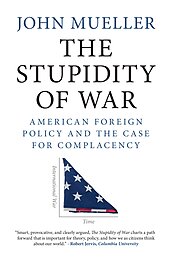It could be said that American foreign policy since 1945 has been one long miscue; most international threats—including during the Cold War—have been substantially exaggerated. The result has been agony and bloviation, unnecessary and costly military interventions that have mostly failed. A policy of complacency and appeasement likely would have worked better. In this highly readable book, John Mueller argues with wisdom and wit rather than ideology and hyperbole that aversion to international war has had considerable consequences.
The Stupidity of War
American Foreign Policy and the Case for Complacency
There has seldom been significant danger of major war. Nuclear weapons, international institutions, and America’s super power role have been substantially irrelevant; post-Cold War policy has been animated more by vast proclamation and half-vast execution than by the appeals of liberal hegemony; and post‑9/11 concerns about international terrorism and nuclear proliferation have been overwrought and often destructive. Meanwhile, threats from Russia, China, Iran, and North Korea, or from cyber technology are limited and manageable. Unlikely to charm Washington, Mueller explains how, when international war is in decline, complacency and appeasement become viable diplomatic devices and a large military is scarcely required.
“Unfailingly incisive, witty, original, prescient, and constructively contrarian. True to form, this case for complacency will shake you out of your complacency on American military policy.”
—Steven Pinker, Harvard University
“John Mueller is incapable of writing a boring sentence. a thought-provoking, brilliant, funny and iconoclastic work. It would be very difficult for even the most hardened foreign policy professionals to read it and come away with their basic assumptions intact.”
—Christopher Fettweis, Tulane University
“Mueller makes a convincing case that our rivals are far less formidable that we imagine – and that, in fact, the 21st century has brought a worldwide understanding of the folly of war that should reshape how governments and citizens think about national security.”
—Stephen Chapman, Chicago Tribune
“Powerfully argued [and] clearly written.”
—Marvin Kalb, The Washington Post
About the author
John Mueller is a senior fellow at the Cato Institute. He is also a member of the political science department and senior research scientist with the Mershon Center for International Security Studies at the Ohio State University.
